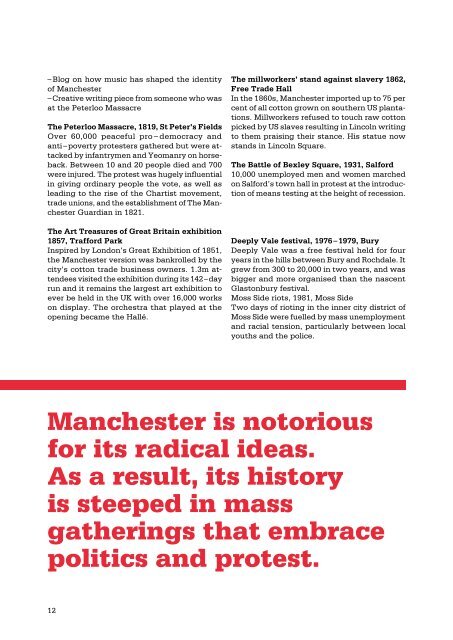THFMagazine2018/19
Create successful ePaper yourself
Turn your PDF publications into a flip-book with our unique Google optimized e-Paper software.
The Home Magazine 2018.<br />
– Blog on how music has shaped the identity<br />
of Manchester<br />
– Creative writing piece from someone who was<br />
at the Peterloo Massacre<br />
The Peterloo Massacre, 18<strong>19</strong>, St Peter’s Fields<br />
Over 60,000 peaceful pro – democracy and<br />
anti – poverty protesters gathered but were attacked<br />
by infantrymen and Yeomanry on horseback.<br />
Between 10 and 20 people died and 700<br />
were injured. The protest was hugely influential<br />
in giving ordinary people the vote, as well as<br />
leading to the rise of the Chartist movement,<br />
trade unions, and the establishment of The Manchester<br />
Guardian in 1821.<br />
The Art Treasures of Great Britain exhibition<br />
1857, Trafford Park<br />
Inspired by London’s Great Exhibition of 1851,<br />
the Manchester version was bankrolled by the<br />
city’s cotton trade business owners. 1.3m attendees<br />
visited the exhibition during its 142 – day<br />
run and it remains the largest art exhibition to<br />
ever be held in the UK with over 16,000 works<br />
on display. The orchestra that played at the<br />
opening became the Hallé.<br />
The millworkers’ stand against slavery 1862,<br />
Free Trade Hall<br />
In the 1860s, Manchester imported up to 75 per<br />
cent of all cotton grown on southern US plantations.<br />
Millworkers refused to touch raw cotton<br />
picked by US slaves resulting in Lincoln writing<br />
to them praising their stance. His statue now<br />
stands in Lincoln Square.<br />
The Battle of Bexley Square, <strong>19</strong>31, Salford<br />
10,000 unemployed men and women marched<br />
on Salford’s town hall in protest at the introduction<br />
of means testing at the height of recession.<br />
Deeply Vale festival, <strong>19</strong>76 – <strong>19</strong>79, Bury<br />
Deeply Vale was a free festival held for four<br />
years in the hills between Bury and Rochdale. It<br />
grew from 300 to 20,000 in two years, and was<br />
bigger and more organised than the nascent<br />
Glastonbury festival.<br />
Moss Side riots, <strong>19</strong>81, Moss Side<br />
Two days of rioting in the inner city district of<br />
Moss Side were fuelled by mass unemployment<br />
and racial tension, particularly between local<br />
youths and the police.<br />
Manchester is notorious<br />
for its radical ideas.<br />
As a result, its history<br />
is steeped in mass<br />
gatherings that embrace<br />
politics and protest.<br />
The Festival of the Tenth Summer, <strong>19</strong>86,<br />
Various venues<br />
A music and arts festival organised by Factory<br />
Records to celebrate 10 years since the Sex Pistols<br />
played the Lesser Free Trade Hall, viewed<br />
by many as catalyst for a generation of Manchester<br />
musicians. The final gig at G – Mex was<br />
headlined by New Order and The Smiths.<br />
Acid house raves, <strong>19</strong>86-92, The Kitchen,<br />
The Haçienda and beyond<br />
From <strong>19</strong>86 acid house became the underground<br />
sound of the city, from warehouses and illegal<br />
clubs like The Kitchen to Factory Records’<br />
legendary hangout The Haçienda and the city<br />
fully embraced the communal nature of the rave<br />
revolution.<br />
Section 28 rally, <strong>19</strong>88, Albert Square<br />
20,000 people descended on Albert Square for<br />
a rally against the Conservative government’s<br />
Section 28 act, which decreed that councils<br />
should not ‘intentionally promote homosexuality<br />
or publish material with the intention of<br />
promoting homosexuality’.<br />
Manchester Pride, <strong>19</strong>89-present day,<br />
Manchester gay village<br />
Manchester’s annual LGBT festival and parade<br />
attracts thousands from across the UK to the<br />
city’s gay village in and around Canal Street.<br />
The three – day celebration takes over the city<br />
every August bank holiday.<br />
Dpercussion, <strong>19</strong>97-2007, Castlefield<br />
Initially conceived as Manchester’s response<br />
to the <strong>19</strong>96 IRA bomb that injured 200 people<br />
and devastated the city centre, Dpercussion<br />
became a huge free urban music festival, with<br />
over 70,000 people pouring into Castlefield every<br />
August. The festival was a precursor to what<br />
became Parklife.<br />
Reclaim the Night, <strong>19</strong>77 – Present Day, Oxford<br />
Road<br />
A yearly women’s march in Manchester, is returning<br />
on the 22nd February to allow women<br />
to ‘raise their voices and unite their energies to<br />
stand up to street harassment, sexual violence<br />
and victim blaming<br />
England riots, 2011, Manchester and Salford<br />
Following the shooting of Mark Duggan, riots<br />
broke out all over the UK. Thousands of youths<br />
ransacked shops, attacked officers and torched<br />
cars in the city centre and over a thousand police<br />
and supporting staff were deployed. Police<br />
were called to 800 incidents in the city centre<br />
and the Fire Service reported 155 fires across<br />
the city centre and Salford.<br />
Stop Brexit and anti – austerity protests, 2017,<br />
Manchester City Centre<br />
Around 30,000 Anti – Brexit campaigners and<br />
activists, protesting the government’s austerity<br />
policies held rallies to coincide with the start of<br />
the Conservative Party conference. Protesters<br />
were demanding a second Brexit referendum<br />
and an end to the Government’s austerity policies.<br />
LGBT Campaign<br />
From protests to flash mobs, Manchester has<br />
played a significant part in the campaign for<br />
lesbian, gay, bisexual, and transgender (LGBT)<br />
rights. The history of the Manchester’s LBGT<br />
community is an important part of the social and<br />
cultural history of the city and the North West.<br />
The LGBT community has had to campaign for<br />
its rights. Just fifty years ago many homosexual<br />
acts were illegal and the community was hidden<br />
and discriminated against. Manchester was<br />
the birthplace of the Campaign for Homosexual<br />
Equality in <strong>19</strong>64 and in the lead up to the passing<br />
of the <strong>19</strong>67 Sexual Offences Act, one of the<br />
influential meetings was held in Manchester on<br />
Deansgate. Currently the city hosts the United<br />
Kingdom’s largest lesbian, gay, bisexual and<br />
transgender (LGBT) community outside London<br />
and is renowned for its Gay Village centred on<br />
Canal Street.<br />
The Suffragette Movement<br />
In the nineteenth century Manchester was a<br />
hot-bed of radical and liberal thinking in many<br />
areas, political, social, economic and religious.<br />
Women were struggling to have a say in public<br />
affairs, to have a vote and in <strong>19</strong>03 Emmeline<br />
Pankhurst established the ‘Women’s Social Political<br />
Union’ in response to her dissatisfaction<br />
with the progress of the ‘Manchester Women’s<br />
Suffrage Committee’ at her house at 62 Nelson<br />
Stree, the Pankhurst centre.<br />
12<br />
13



